5 Sweat Community Members Share How They Work Out During Ramadan

April 22, 2022

When we shared some tips for working out during Ramadan, many women in the Sweat Community shared their own advice and experiences, and others spoke about always finding it a tricky time. During this period of fasting, it can be hard to know whether to continue with your usual routine or what changes to make.
We spoke to five members of the Sweat Community who are observing Ramadan - Sabrina, Zubeda, Aisyah, Munni and Areeba - to learn more about how their workout schedules have changed, what Ramadan means to them, and their advice for other women.
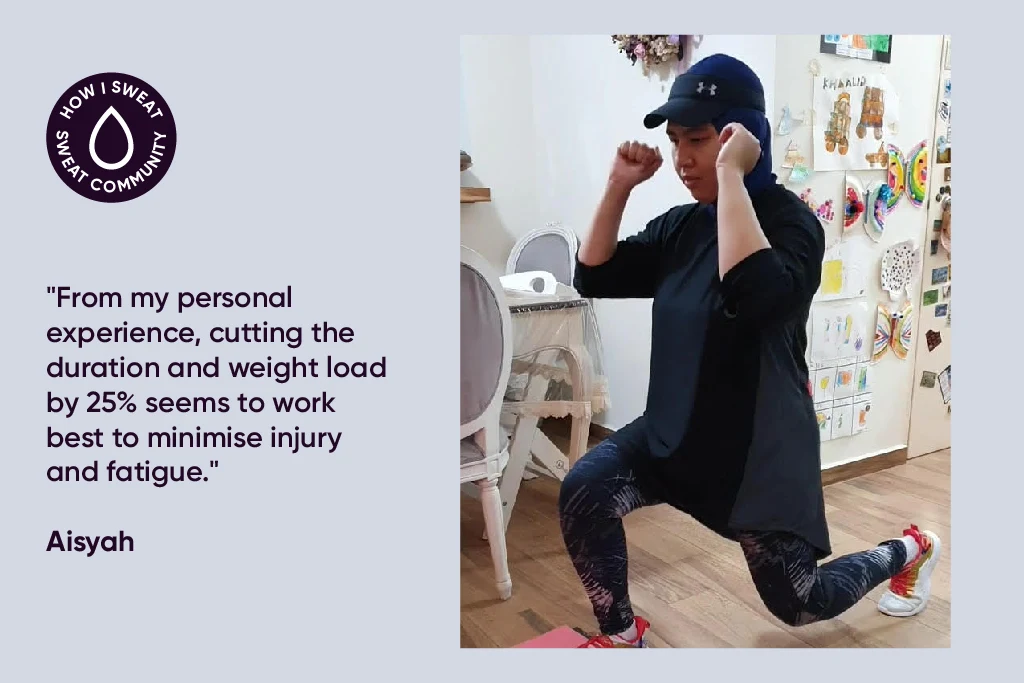
How does your workout schedule change during Ramadan?
You can still stay active during Ramadan, but making some adjustments is definitely recommended. Each of the women we spoke to made changes to their routine based on the intensity of their previous programs, their caring responsibilities, when they felt best to exercise and where in the world they live.
“To be honest my schedule has not changed drastically,” Sabrina (@sabrina_ameer) told us. “In other months I work out at 5 pm but during Ramadan I work out around two hours before Iftar which is at 4 pm.”
While Sabrina did consider training before the morning meal, she admitted 3 am was quite the early start. Another Sweat Community member, Munni (@munnumusa), removes all the cardio and high intensity training from her week, and switches from morning to shorter evening workouts.
“As much as I want to maintain my fitness and keep moving, I am conscious I still have to work a full day, fit in time to pray, cook dinner, and do other chores,” she says.
“I find exercise does boost my energy levels and helps me sleep better, and I use this time as a mental detox and downtime.”
Zubeda (@zbdgetfit) has also stopped training in the mornings during Ramadan and aims to finish her workouts 10 to 15 minutes before she breaks her fast.
“I mostly train an hour or so before Iftar, this allows me to fuel my body soon after my workout.”
For Areeba (@areebas.blog), Ramadan is a time to reduce the intensity of her workouts, and she says how much you can do often depends on the temperature and humidity where you live.
“In the Middle East or Asian countries, the heat and humidity during Ramadan makes it quite challenging for us to fast, do chores, work and take care of the kids. Between all this, you can’t even think about taking out time to do an intense workout,” she says.
Aisyah (@aisyah.wellness.journey) has had a similar experience with finding balance and taking things a bit slower.
“During Ramadan, I still try to maintain my 3-4 weekly resistance sessions. From my personal experience, cutting the duration and weight load by 25% seems to work best to minimise injury and fatigue. I have tried doing short HIIT strength sessions during Ramadan in the past, but it's too much of a strain for me. For this Ramadan I'm trying out Kelsey Wells’ new program, Redefine Fitness: Strength and Mindfulness, which fits really well in the spirit of Ramadan.”
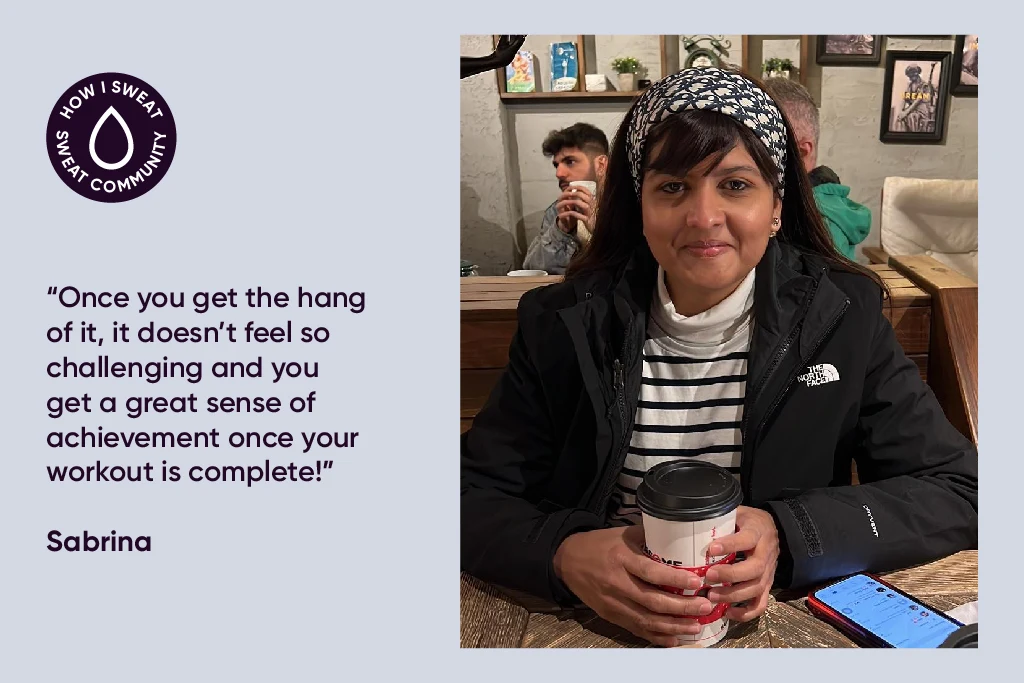
Is there anything you find challenging about working out during Ramadan?
Both Zubeda and Aisyah told us that adjusting to a new schedule or finding a good time to exercise can be a challenge. For Aisyah, the afternoon is the best time to work out during Ramadan, but when she’s low on energy it takes a lot of discipline to lace up and show up!
Sabrina says it can be tough in the first few days getting used to not being able to drink water in between sets.
“Once you get the hang of it, it doesn’t feel so challenging and you get a great sense of achievement once your workout is complete!”
“Your energy levels during this time are on the lower side from fasting and having an intense workout routine would be totally unhealthy,” says Areeba. “It’s good to stay active, but too much exercise while fasting can lead to reduced muscle mass and strength.”
Finding motivation and energy can be tough for Munni, due to fasting and disrupted sleep patterns.
“If I’m not feeling up to a workout, I don’t force myself,” she says, and focuses on long walks in London while listening to podcasts.
What tips or advice would you give to other women who are on a fitness journey and observing Ramadan?
If there’s one thing they all agreed on, it’s the importance of finding what works best for YOU, listening to your body and not being afraid to lower the intensity.
“Your priorities are different for this month, and you can pick up your usual pace after Ramadan,” says Aisyah.
“Find a routine that suits you and is not too demanding on the body. We often think our bodies can handle a tough workout while fasting, but end up draining ourselves. I made that mistake a few years ago and it drained me physically. Choose a program you will enjoy, schedule your week and stick to it,” Sabrina suggests, and recommends practising yoga or Pilates if you don’t feel up to your usual workouts.
“If nothing is suitable and you feel too exhausted, just moving your body by walking every day is great. Don’t forget to stay hydrated and eat well! This will give you energy throughout the day and for your workout.”
On the importance of good nutrition and hydration, Munni says it can be tempting to eat lots of traditional fried foods at iftar, but she knows it leaves her feeling lethargic the next day, so prefers to have more balanced meals and homemade treats.
Ramadan is a great time for her to set goals and focus on consistency too.
“I like to set myself daily and weekly goals for my health, things I want to learn, or chapters I want to read of the Quran. Set yourself consistent wake up times, sleep times, phone-free time, prayer times, and me time! Those goals and consistency will eventually turn into your routine, whether it is going for a walk, listening to a podcast or exercising before dawn.”
For Areeba, just staying active is more important than getting a challenging workout in. “Don’t push yourself to the limit or overexert yourself. It’s okay to stick to basic exercise just to keep moving. Walking is always a great option!”
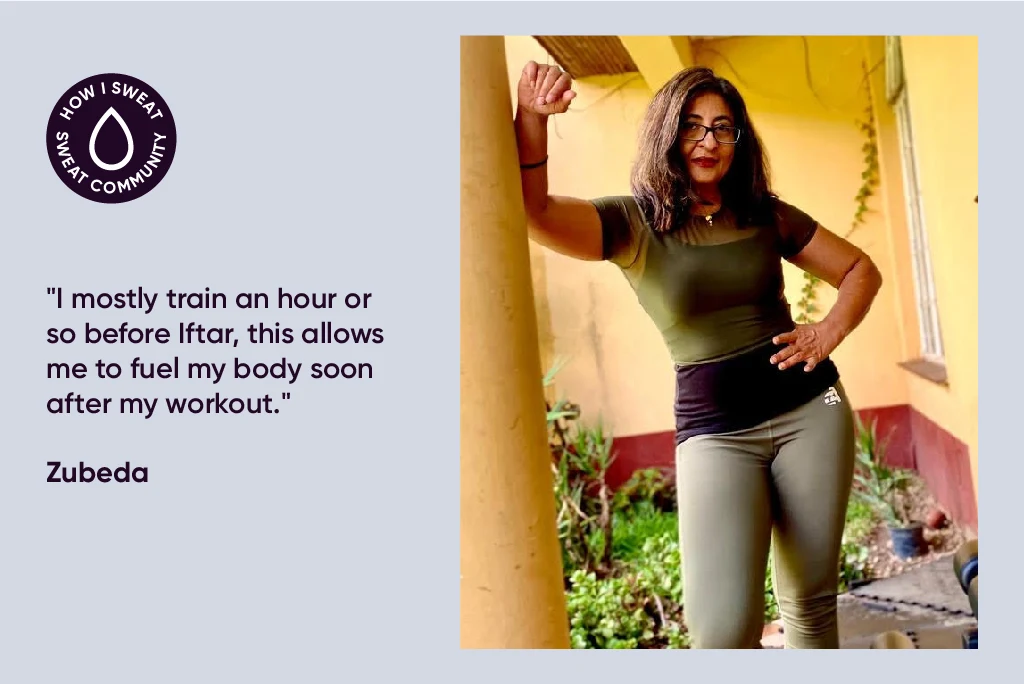
What's your favourite thing about Ramadan?
“There are countless things I love about the Holy month of Ramadan, but for me the best thing is the sacred connection I develop with Allah Subhan wa’Taala. Not missing any Salah (prayer) and trying to develop good habits makes life much simpler,” Areeba says.
Sabrina, Munni and Aisyah all appreciate the time spent with family sharing meals and praying together. Having a husband who is busy with work means that for Munni, sharing every single meal together for the month is really special. She says every night feels like date night!
Aisyah is also enjoying teaching her five-year-old about the meaning of Ramadan and rewarding him with stickers for his good deeds.
For Zubeda, she loves the discipline and says she gets more done in Ramadan than any other time of year!
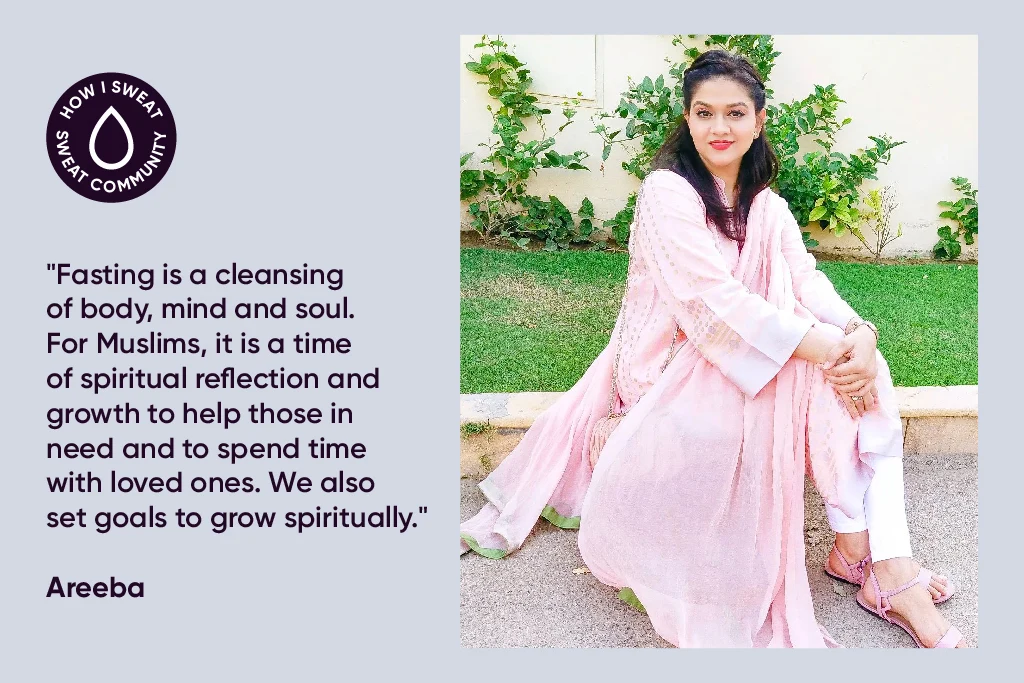
What do you wish other people knew about Ramadan?
All the women we spoke to said that although most people know about the fasting involved in Ramadan, the spiritual component is also really important.
There is also a misconception that Ramadan involves being starved of food and water, but there are set hours to follow for fasting between the hours of sunrise and sunset and people eat outside of those hours.
“Ramadan is the holiest month of the year in Islamic culture when Muslims around the world fast during the day. Fasting is a cleansing of body, mind and soul. For Muslims, it is a time of spiritual reflection and growth to help those in need and to spend time with loved ones and we set goals to grow spiritually. Muslims spend time praying, reciting the Holy Quran and doing good deeds. They donate, do charity, focus more on spreading the Sunnah of The Prophet Muhammad to others and spend time with loved ones,” Areeba says.
“It is one of the Five Pillars of Islam, which are the foundation of how Muslims live their lives (the other pillars are faith, prayer, charity and pilgrimage to the holy city of Mecca). We observe fasting and abstaining from things like smoking, drinking, lying, gossiping, fighting, and sexual intercourse between sunrise and sunset each day - at least we try to! Fasting is important during Ramadan as it allows Muslim to dedicate themselves to their faith, get closer to Allah and learn patience and compassion. It’s about nourishing the soul, rather than only focusing on the physical body.”
Sabrina, Munni and Zubeda added to this, saying the most important thing about Ramadan is that it is a month of spiritual rejuvenation and a time for reflection, self-discipline, and learning to be more compassionate and empathetic.
“Muslims love Ramadan and there is so much fanfare that non-Muslims think it's our New Year,” Aisyah says, highlighting the strong emphasis on social responsibility.
“We are highly encouraged to feed the less fortunate and assist others in any way we can within our means. Ramadan is a period of spiritual recharge and many of us perform additional prayers at night, or try to read the Quran, our Holy Book. This is no mean feat as it’s about 600 pages long!”
“A lot of Muslims use this month to either learn something new about Islam, learn to recite a new passage or verse from the Quran, which often involves late nights,” says Munni.
“This month is often about solitude, devotion to your faith and reminding yourself of your priorities in the bigger scheme of things. My focus and intentions around Ramadan are always to be kind, mindful and present. I see it as a month of reflecting and use this time to inwardly reflect and donate my time and money to worthy causes.”
Munni says a lot of people also don’t realise how much physical energy is used for Salah - the compulsory prayers five times each day.
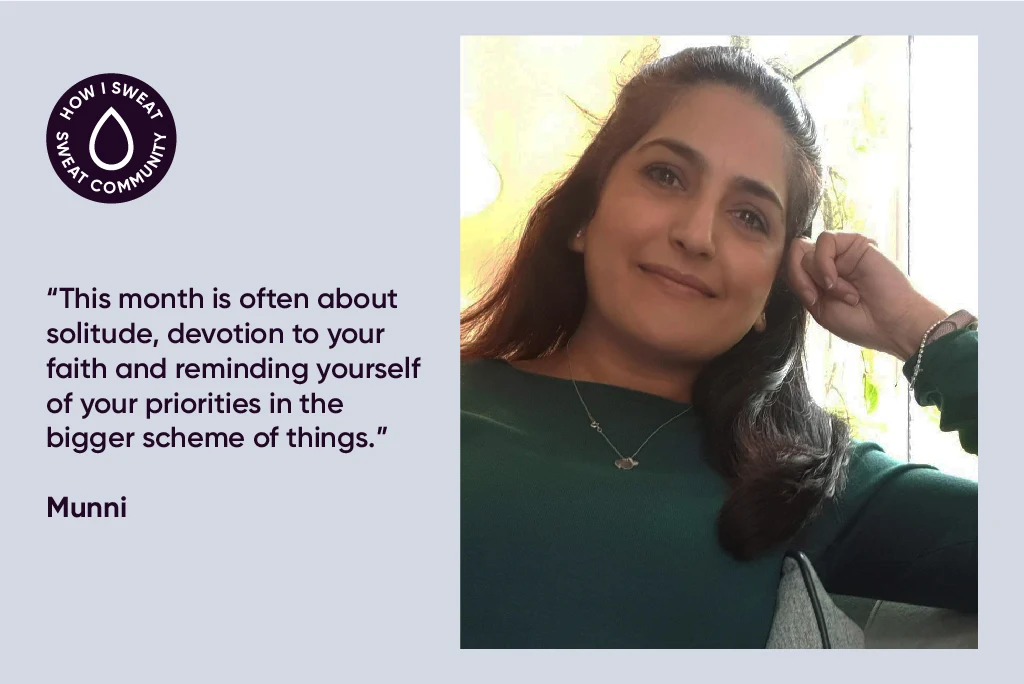
How will you celebrate Eid al-Fitr?
“After completing 29 or 30 days of fasting (depending upon the sighting of the moon) we celebrate Eid al-Fitr commonly known as meethi Eid (sweet eid),” says Areeba.
“It’s a 3-day celebration all about meeting family, friends and people, where we share gifts, wear colourful bright clothes, and decorate ourselves with things like henna and bangles. It is full of life and blessings. I am definitely going to spend it helping people who are not privileged to celebrate Eid the way we do. We should always count our blessings and be thankful for what we have rather than chasing after what we don’t.”
Eid is a big event for Munni spent with her large family - a day full of colour, celebration, love, gift-giving and beautiful clothes, along with lots of hands helping to prepare the 10 course feast!
“In Leicester there is a large Muslim community and the mosque is able to cater for prayers in a local park. A huge marquee is set up and both women and men are able to attend in separate areas,” she adds.
Zubeda is looking forward to prayers, spending time with family, feasting, wearing new clothes and giving gifts.
Because of the pandemic restrictions, many haven’t been able to celebrate in person for a few years. Sabrina says her family is so excited about finally being able to celebrate together.
Are you observing Ramadan and have helpful tips of your own? We would love you to share them in the comments!

A more empowered you starts with Sweat, and our editorial team is here to bring you the latest fitness tips, trainer recommendations, wellbeing news, nutritional advice, nourishing recipes and free workouts.
* Disclaimer: This blog post is not intended to replace the advice of a medical professional. The above information should not be used to diagnose, treat, or prevent any disease or medical condition. Please consult your doctor before making any changes to your diet, sleep methods, daily activity, or fitness routine. Sweat assumes no responsibility for any personal injury or damage sustained by any recommendations, opinions, or advice given in this article.
Community